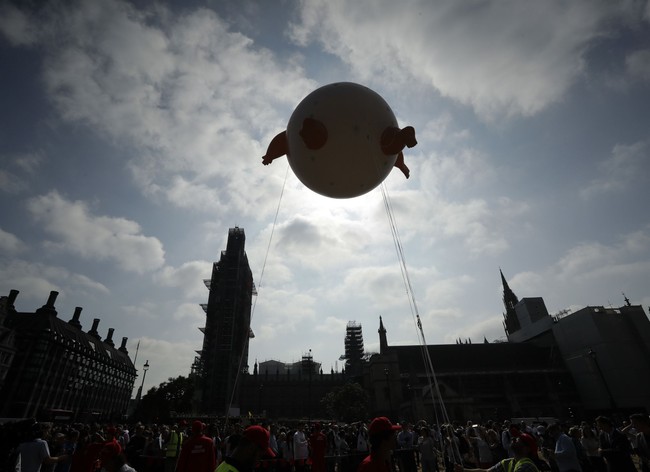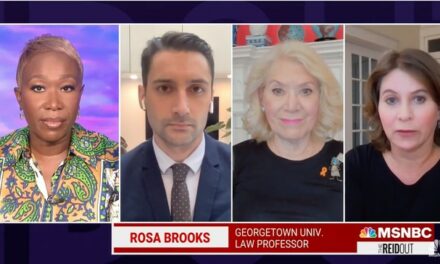We support our Publishers and Content Creators. You can view this story on their website by CLICKING HERE.

I have written numerous times about how free speech is under attack in the West.
The ostensible reason for the speech crackdown is to preserve liberal democracy, proving once again that totalitarian regimes use wordplay as a means to confuse, demoralize, and justify their suppression of dissent.
Advertisement
There are countless cases I could point to across the West, but one recent example stands out because it is so brazen–threatening a journalist with arrest over a tweet–that it demonstrates how confident the United Kingdom government is in its war on freedom.
They almost succeeded in America and would have done the same thing here if @realDonaldTrump had not won https://t.co/kuE1ulPgyG
— Elon Musk (@elonmusk) November 16, 2024
The high-profile person the UK government has gone after is Allison Pearson, a journalist with the center-right broadsheet The Telegraph. While not a “star” reporter, she is prominent enough and attached to the well-regarded paper that serves the role of, say, The Wall Street Journal or New York Times in the UK.
Pearson is being investigated for a tweet from over a year ago, since deleted, that made it clear that she thought that there were double standards in policing. Islamists get treated with kid gloves, while native Britons get treated like dirt. If the Essex police wanted to prove her point, they certainly have.
The story so far.
1. I am not a racist.
2. I didn’t post a racist tweet.
3. My tweet did not incite violence against any protected characteristic.
4. My fairly innocuous tweet was deleted a year ago.
5. Senior lawyers say my tweet does “not come near the threshold for criminal…— Allison Pearson (@AllisonPearson) November 16, 2024
Advertisement
Attacking a journalist’s speech is not any more morally reprehensible than attacking Jim or Jodie down the street, but governments are generally more wary of going after people with high profiles. It isn’t until the regime is confident that they can get away with nearly anything that they go after the bigger fish.
There has been quite the backlash in the media over the questioning (and threatened arrest) of Pearson, and the police are feeling the heat, although they aren’t yet backing down.
‘The police are hellbent on criminalising people who have simply expressed their opinion’
Harry Miller fumes at Alison Pearson being investigated over a tweet she put out over a year ago. He says we have a ‘Stasi police force’ in the UK who are working for our ‘woke government’. pic.twitter.com/NvqXeCdF6p
— GB News (@GBNEWS) November 14, 2024
Pearson wrote about her encounter with the speech police in The Telegraph, and her experience, while Kafkaesque, was far more gentle than those of other lower-profile people who are now serving jail sentences for actions or tweets that any American would consider polite bar talk.
9.40am: All my things were laid out ready for Remembrance Sunday. Black dress, black opaque tights, coat, a new poppy to go with the vintage enamel one that glints in my jewellery box awaiting its annual outing. I was still not dressed when Himself called up to say that there were police at the door for me. I did vaguely wonder what on earth they were doing here – something to do with our road being closed for the parade? But I went downstairs to greet them at the door and apologised to the two young constables standing outside for still being in my dressing gown. I wasn’t sorry for long.
PC S, the one on the left, who did all the talking, told me that they were here to inform me that I had been accused of a non-crime hate incident (NCHI). It was to do with something I had posted on X (formerly Twitter) a year ago. A YEAR ago? Yes. Stirring up racial hatred, apparently.
WHAT? I stood there in my slippered feet trying to take in what the police officer had said; our market town was filled with the sounds of preparation for the forthcoming parade – a distant drummer, the metallic clang of barriers going up. Life going on as normal, but this wasn’t normal; it was far from normal.
“What did this post I wrote that offended someone say?” I asked. The constable said he wasn’t allowed to tell me that.
“So what’s the name of the person who made the complaint against me?”
He wasn’t allowed to tell me that either, he said.
“You can’t give me my accuser’s name?”
“It’s not ‘the accuser’,” the PC said, looking down at his notes. “They’re called ‘the victim’.”
Ah, right. “OK, you’re here to accuse me of causing offence but I’m not allowed to know what it is. Nor can I be told whom I’m being accused by? How am I supposed to defend myself, then?”
Advertisement
Think about that. “They are called the ‘victim.'” Somebody is offended, and the police assume they have been assaulted, and all that is left is prosecution and conviction.
Pearson was accused of a Non-Crime Hate Incident. Even the name says “non-crime,” but the police can still come to your door and in many cases arrest you. They need not tell you what you are accused of nor who is doing the accusing.
Who, exactly, is the victim here? The person who sets the police on you or the person who the police are threatening?
How do we stop this?
When the politicians, legacy media, police, judiciary are all against the people what do you do?
Britons gave up their guns and their faith willingly, and now find themselves naked before authoritarian Marxists.
How do we reject this anti-British tyranny? https://t.co/7uvFidUWbc
— Fr Calvin Robinson (@calvinrobinson) November 15, 2024
People are–quite literally–getting arrested in the dead of night for things they say in person or online. Not for threats, mind you, but opinions that the current regime finds unpalatable.
Objecting to British streets being lined with Palestinian flags is enough to get SWAT teams bursting through your door at 4 A.M.
🚨 BREAKING: A British man arrested at
4am for expressing his opinion on Facebook about a Palestinian flagLook how many police have gone to arrest him!
Are the police a joke or what ? There are people being stabbed, murdered and raped.. but social media post are a priority pic.twitter.com/R6jHI23Wwm
— WeGotitBack 🏴🇬🇧🇺🇸 (@NotFarLeftAtAll) November 17, 2024
Advertisement
This is totalitarian, and that is not an exaggeration. The goal is not to put lots of people in jail–although in Britain they are letting pedophiles off with warnings and releasing violent criminals from jail to make room for people who commit thought crimes–but to intimidate the masses into compliance.
For those of you who think “It can’t happen here,” you are wrong. It is precisely what the Harris administration would have tried to do, and plenty of left-wing pundits have been calling for.
They have inverted things and convinced themselves that free expression is tyranny.
Robert Reich (image), and Justin Trudeau (see video)https://t.co/iwKBBcVRSf pic.twitter.com/45eaLAnMHx
— Mark Changizi (@MarkChangizi) September 1, 2024
Elon Musk has been declared “Public Enemy #2” in Germany, and there was a movement to strip him of his companies or to force the government to quit using their services. The Biden administration coyly supported the European Union’s threats to fine all of Musk’s companies if he didn’t censor Twitter/X.
Modern-day fascists always call others fascists.
Case in point? Rachel Maddow saying that Kamala Harris should cancel Elon Musk’s SpaceX and Starlink contracts if she wins as political retribution.
— Bonchie (@bonchieredstate) November 5, 2024
Europe has always been one step away from sliding into fascism, which, after all, originated on the continent. Censorship of one sort or another has been woven into those countries’ cultures forever. The age of free speech has been a historical anomaly, unfortunately.
Advertisement
So as bad as I find Germany, France, or Belgium sliding into speech policing, it is the spread to the Anglo-American world that shocks and infuriates me.
understand this sounds hyperbolic and crazy, but it seems the london met police are threatening to extradite elon musk for speech crime? pic.twitter.com/nOkv8ZMGbU
— Mike Solana (@micsolana) August 9, 2024
The rights of Englishmen have been more expansive for a millennium, and the Scottish Enlightenment helped formalize freedom of speech and conscience. But throughout the Anglosphere, totalitarianism is spreading.
A journalist from The Guardian wants Elon Musk extradited from America and placed on trial for expressing his views on what is going on in the UK.
The mainstream media has truly lost the plot. pic.twitter.com/nzwr2yKI6O
— Lewis Brackpool (@Lewis_Brackpool) August 10, 2024
The election of Trump has set the movement back far more than we can know as of yet–I suspect that Trump will slap down any attempts to moderate speech in America and, therefore, by extension, the world because social media companies are based here. Trump will likely pressure European countries to curb their tyrannical impulses even at home. Musk is committed to free speech, and I suspect that will translate into diplomatic pressure for reduced restrictions elsewhere.
But make no mistake: speech control is at the top of the transnational elite’s agenda. As important as fixing things at home truly is, one of the key goals of Trump’s administration has to be harming the interests of the transnational elites in any way he can short of violating their rights.
Advertisement

 Conservative
Conservative  Search
Search Trending
Trending Current News
Current News 







